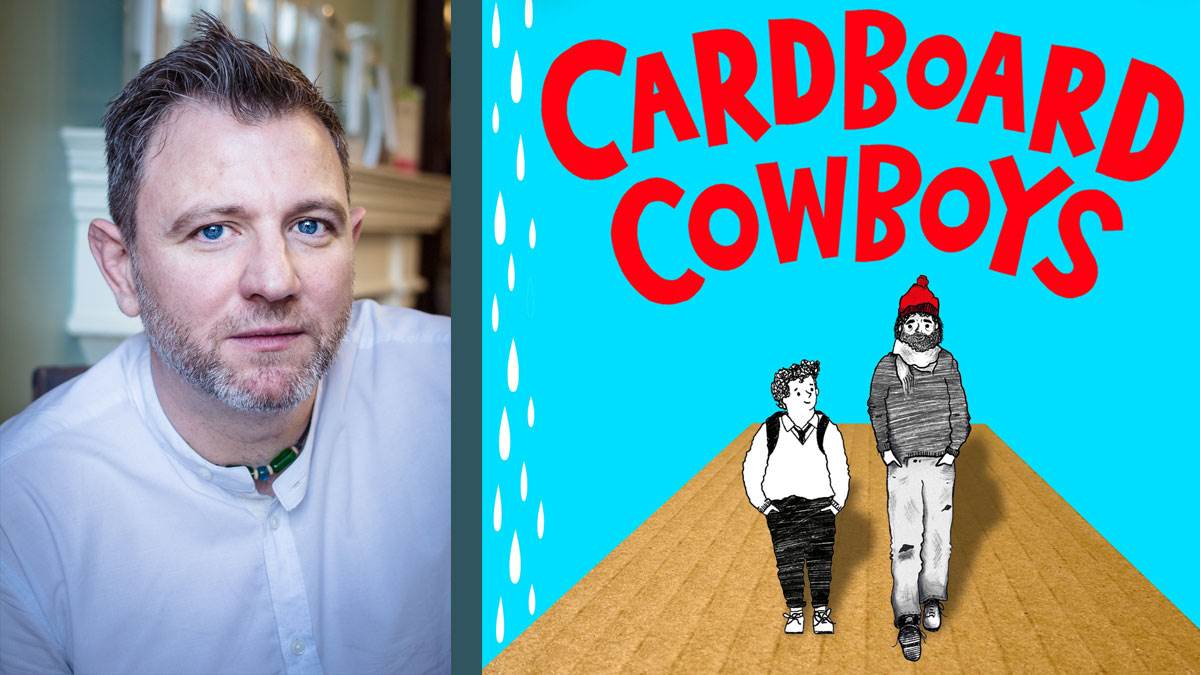Writing about teenage boys: Body image, bullying, big feelings and more
Published on: 04 July 2021
Brian Conaghan is well known for his brilliant books for older teenagers and his most recent, Cardboard Cowboys, tackles some moving and sensitive themes through the eyes of 12-year-old Lenny – as well as celebrating friendship and community. He tells us more.

In Cardboard Cowboys, your main character Lenny is bullied for being overweight. What inspired you to write about weight and body image in this way?
Among other things Lenny is loosely based on a friend of mine who was mercilessly bullied when we were kids because of his size. He dealt with the torments and taunts with such dignity and humour that I knew I wanted to tell his – somewhat – story. Sadly, he is no longer with us, which makes Lenny’s character so much more poignant for me.
Lenny even uses bad words to talk about himself – jelly, fat, blubber. How hard is it to represent that kind of internalised bullying in a character, where they start to believe what everyone says?
It’s very difficult, but it’s about survival for people like Lenny. I don’t believe that he does believe what people actually say to him is true, however it is a constant battle to fend-off that notion. Lenny’s survival technique is self-deprecation.
It’s interesting to look at body image from a 12-year-old boy’s perspective – how has the pressure to look a certain way changed for boys, do you think? How do boys respond to this kind of pressure?
The very idea that kids so young are acutely aware of body image is something we, as adults and as a society, should hang our heads in shame about. The pressure for all children, not just boys, nowadays is insurmountable.
Around that age of 12, so many things can change: your body changes, you move to secondary school – friendship groups can change and the way we see the world can suddenly be very different. What was it like for you writing a younger protagonist than you have before and keeping all these things in mind?
It was pretty straightforward to be honest. I just delved back into my 12-year-old-self, which is a really enjoyable thing to do. That emotional memory has never left me.
Do you think we see enough books for teenage boy readers that deal with complex emotions and daily life?
I actually believe that there are many books that deal with ‘complex emotions and daily life’, and you could argue that ALL books deal with this topic in one way or another. However, writers such as Will Sutcliffe, Anthony McGowan, Patrick Ness and Des Dillon deal with youthful male emotions – among other things – very successfully indeed.
Nevertheless, if we really wish to engage teen boys, who are notoriously reluctant readers, it's vital that they see themselves, their experience(s) and their voice reflected back to them in novels.
Why is it important for boys to read books that are about feelings and our relationships with others?
It’s important for everyone to read about feelings and relationships. Books can unlock doors, answer awkward questions, enlighten, educate and aid understanding. At that tender age, these things are important...
Further reading...
Here are other books on similar themes that may be useful and interesting for young readers.
Favourite books about difference, acceptance and bullying for teens
Here are some books to help teens who may be experiencing bullying or finding it tricky to make friends.
Book to support mental health awareness for ages 8 and over
Books that acknowledge or explore mental health issues can help to increase awareness, encourage dialogue, reduce stigma and develop real understanding. The following suggestions offer a spectrum of different perspectives and are well worth seeking out.
Books about masculinity
Our pick of the best books to help boys develop confidence, compassion, and an understanding of healthy masculinity.
Topics: 12+, Bookmark, Bullying, Personal/social issues, Interview, Mental health, Features








